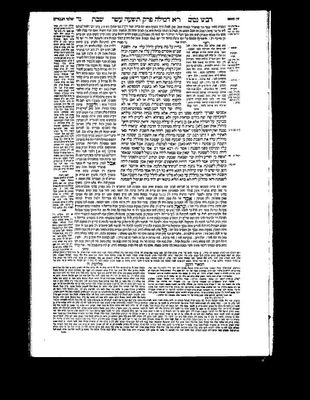
HIDE/SHOW IMAGE
54a
{Shabbat 135a continues}
{Bet Shammai and Bet Hillel argue} regarding whether to desecrate Shabbat for him {to cause a few drops of the covenant blood to flow from him on Shabbat}. For Bet Shammai say: we desecrate Shabbat for him; and Bet Hillel say we do not desecrate Shabbat for him.
From this we may derive that the Tanna Kamma {who argues with Rabbi Eleazar haKappar cited immediately above} maintains that the words of all {=both Bet Shammai and Bet Hillel} are that we do not desecrate Shabbat for him.
And because Rabba, who is later {than Rav and Shmuel}, learned {this} from this brayta, we thus deduce that this is the halacha. And even though Rav Yosef argues on him, we have established that {in a case of dispute between} Rabba and Rav Yosef, the halacha is like Rabba, with the exception of {and here we can refer to Bava Batra 104b} Field {when one of the heirs has a field adjoining the field that is to be divided}, Subject {they stay within the subject and thus do not nullify the testator's instructions}, and Half {where a testator expressed the wish that his estate be divided between his wife and his son}.
{The Rif earlier applied this principle in masachet Shabbat on daf 15a in his pages.}
Therefore we hold like Rabba who said that "We suspect that it may be a suppressed foreskin," and therefore we must to cause a few drops of the covenant blood to flow from him on a weekday, but not on Shabbat, for in a case of doubt, we do not desecrate the Shabbat.
And so is the halacha.
{The Rif attributes the following} To Rabbenu Hai Gaon, זצ"ל:
"And this that you asked, 'one who is born circumcised, must we cause a few drops of the covenant blood to flow from him, or not? and if we must cause a few drops of the covenant blood to flow from him, do we say a blessing on it or not?'
The rule of the matter is that the Rabbis before me in the Mesivta so agreed that we must cause a few drops of the covenant blood to flow from him; however, it should be done gently, and we need to inspect the matter carefully with hands and eyesight, and not with iron {implements}, so as not to distress him, and we do not bless on the circumcision unless it is discernible that he has a suppressed foreskin.
And we check and are careful how we circumcise him, and if no foreskin is visible, we wait for him a long time, so that we do not bring him to danger, and we pay no heed to {the desire to circumcise on} the eighth {day}.
Master said {that is, we said earlier}: And doubt does not push of Shabbat.
To include what? {for the various cases of doubt had been enumerated}
To include this, that the Sages learnt {in a brayta}: For a seven-months' infant {one born after seven months of pregnancy} one may desecrate Shabbat, but for an eight-months' infant one may not desecrate Shabbat. For one in doubt whether the is a seven-months' or an eight-months' infant, one may not desecrate Shabbat. An eight-months' infant is like a stone and may not be handled, but his mother bends [over] and suckles him because of the danger {to herself, if she is not eased of her milk}.
Rava cited Rav Assi {our gemara: just Rav Assi}: He whose mother is defiled through giving birth must be circumcised at eight [days], but he whose mother is not defiled through giving birth {e.g. if the child is not born in the usual manner but extracted through the cesarean section; or if a Gentile woman gives birth and becomes a proselyte the following day} is not circumcised on the eighth day, for it is stated {Vayikra 12:2}:
| ג וּבַיּוֹם, הַשְּׁמִינִי, יִמּוֹל, בְּשַׂר עָרְלָתוֹ. | 3 And in the eighth day the flesh of his foreskin shall be circumcised. |
He said to him: The Torah was given and the halacha was renewed {changed}.
{Shabbat 135b}
Is this indeed so? But is was stated {by Amoraim}:
If one is extracted through the cesarean section, or has two foreskins -
Rav Huna and Chiyya bar Rav:
One said: We desecrate Shabbat for him {to circumcise}; and one said: We do not desecrate.
They only argue regarding desecrating Shabbat for him, but we certainly circumcise them on the eighth day!
One is dependent on the other.
{That is, the infant who must be circumcised on the eighth day must be circumcised even on Shabbat, since that is deduced from the verse about the (eighth) day, but where the eighth day is not necessary Shabbat may not be desecrated.}
This is a controversy of Tannaim: There is [a slave] born in his [master's] house who is circumcised on the eighth [day],



No comments:
Post a Comment